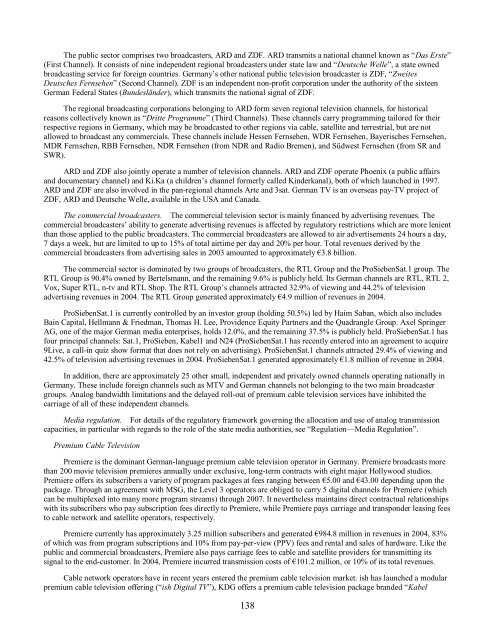iesy Repository GmbH - Irish Stock Exchange
iesy Repository GmbH - Irish Stock Exchange
iesy Repository GmbH - Irish Stock Exchange
Create successful ePaper yourself
Turn your PDF publications into a flip-book with our unique Google optimized e-Paper software.
The public sector comprises two broadcasters, ARD and ZDF. ARD transmits a national channel known as “Das Erste”<br />
(First Channel). It consists of nine independent regional broadcasters under state law and “Deutsche Welle”, a state owned<br />
broadcasting service for foreign countries. Germany’s other national public television broadcaster is ZDF, “Zweites<br />
Deutsches Fernsehen” (Second Channel). ZDF is an independent non-profit corporation under the authority of the sixteen<br />
German Federal States (Bundesländer), which transmits the national signal of ZDF.<br />
The regional broadcasting corporations belonging to ARD form seven regional television channels, for historical<br />
reasons collectively known as “Dritte Programme” (Third Channels). These channels carry programming tailored for their<br />
respective regions in Germany, which may be broadcasted to other regions via cable, satellite and terrestrial, but are not<br />
allowed to broadcast any commercials. These channels include Hessen Fernsehen, WDR Fernsehen, Bayerisches Fernsehen,<br />
MDR Fernsehen, RBB Fernsehen, NDR Fernsehen (from NDR and Radio Bremen), and Südwest Fernsehen (from SR and<br />
SWR).<br />
ARD and ZDF also jointly operate a number of television channels. ARD and ZDF operate Phoenix (a public affairs<br />
and documentary channel) and Ki.Ka (a children’s channel formerly called Kinderkanal), both of which launched in 1997.<br />
ARD and ZDF are also involved in the pan-regional channels Arte and 3sat. German TV is an overseas pay-TV project of<br />
ZDF, ARD and Deutsche Welle, available in the USA and Canada.<br />
The commercial broadcasters. The commercial television sector is mainly financed by advertising revenues. The<br />
commercial broadcasters’ ability to generate advertising revenues is affected by regulatory restrictions which are more lenient<br />
than those applied to the public broadcasters. The commercial broadcasters are allowed to air advertisements 24 hours a day,<br />
7 days a week, but are limited to up to 15% of total airtime per day and 20% per hour. Total revenues derived by the<br />
commercial broadcasters from advertising sales in 2003 amounted to approximately €3.8 billion.<br />
The commercial sector is dominated by two groups of broadcasters, the RTL Group and the ProSiebenSat.1 group. The<br />
RTL Group is 90.4% owned by Bertelsmann, and the remaining 9.6% is publicly held. Its German channels are RTL, RTL 2,<br />
Vox, Super RTL, n-tv and RTL Shop. The RTL Group’s channels attracted 32.9% of viewing and 44.2% of television<br />
advertising revenues in 2004. The RTL Group generated approximately €4.9 million of revenues in 2004.<br />
ProSiebenSat.1 is currently controlled by an investor group (holding 50.5%) led by Haim Saban, which also includes<br />
Bain Capital, Hellmann & Friedman, Thomas H. Lee, Providence Equity Partners and the Quadrangle Group. Axel Springer<br />
AG, one of the major German media enterprises, holds 12.0%, and the remaining 37.5% is publicly held. ProSiebenSat.1 has<br />
four principal channels: Sat.1, ProSieben, Kabel1 and N24 (ProSiebenSat.1 has recently entered into an agreement to acquire<br />
9Live, a call-in quiz show format that does not rely on advertising). ProSiebenSat.1 channels attracted 29.4% of viewing and<br />
42.5% of television advertising revenues in 2004. ProSiebenSat.1 generated approximately €1.8 million of revenue in 2004.<br />
In addition, there are approximately 25 other small, independent and privately owned channels operating nationally in<br />
Germany. These include foreign channels such as MTV and German channels not belonging to the two main broadcaster<br />
groups. Analog bandwidth limitations and the delayed roll-out of premium cable television services have inhibited the<br />
carriage of all of these independent channels.<br />
Media regulation. For details of the regulatory framework governing the allocation and use of analog transmission<br />
capacities, in particular with regards to the role of the state media authorities, see “Regulation—Media Regulation”.<br />
Premium Cable Television<br />
Premiere is the dominant German-language premium cable television operator in Germany. Premiere broadcasts more<br />
than 200 movie television premieres annually under exclusive, long-term contracts with eight major Hollywood studios.<br />
Premiere offers its subscribers a variety of program packages at fees ranging between €5.00 and €43.00 depending upon the<br />
package. Through an agreement with MSG, the Level 3 operators are obliged to carry 5 digital channels for Premiere (which<br />
can be multiplexed into many more program streams) through 2007. It nevertheless maintains direct contractual relationships<br />
with its subscribers who pay subscription fees directly to Premiere, while Premiere pays carriage and transponder leasing fees<br />
to cable network and satellite operators, respectively.<br />
Premiere currently has approximately 3.25 million subscribers and generated €984.8 million in revenues in 2004, 83%<br />
of which was from program subscriptions and 10% from pay-per-view (PPV) fees and rental and sales of hardware. Like the<br />
public and commercial broadcasters, Premiere also pays carriage fees to cable and satellite providers for transmitting its<br />
signal to the end-customer. In 2004, Premiere incurred transmission costs of €101.2 million, or 10% of its total revenues.<br />
Cable network operators have in recent years entered the premium cable television market. ish has launched a modular<br />
premium cable television offering (“ish Digital TV”), KDG offers a premium cable television package branded “Kabel<br />
138

















